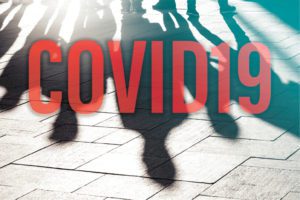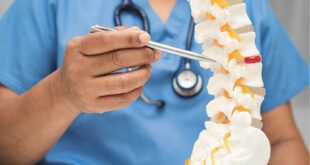 Is Coronavirus a hoax? With so much information in the news, it can be hard to know who or what to believe. Coronaviruses are a group of viruses that commonly cause respiratory infections. COVID-19, is a new strain in the coronavirus family, causing illness in many parts of the world.
Is Coronavirus a hoax? With so much information in the news, it can be hard to know who or what to believe. Coronaviruses are a group of viruses that commonly cause respiratory infections. COVID-19, is a new strain in the coronavirus family, causing illness in many parts of the world.
Is it safe to visit my doctor? It is important to visit your primary doctor for regular health check-ups, health screenings or new concerns. A temporary delay may be considered acceptable, but not visiting your doctors for extended periods of time may result in health complications that can be serious. Physicians are trained in infectious diseases and how to use personal protective equipment, routinely disinfect and sanitize their offices and are going to maintain a safer environment than other public areas.
Should I do a TeleHealth visit? Telemedicine has exploded following the coronavirus crisis and is now covered under many health plans. It is a useful option in certain situations and has a place in patient care, but long-term use is not recommended. Doctors cannot complete a full physical exam, check vital signs or fully evaluate patients in a TeleHealth visit. Certain medical specialties, like psychiatry, may find TeleHealth feasible long term, but many physicians feel it does not allow them to correctly evaluate patients. TeleHealth should be reserved for contagious patients with a cold or flu, mobility-impaired patients, those living in extremely rural areas or other emergencies. It is not a substitute for in person care and risks leaving the patient with undiagnosed medical issues.
Are the models and projections for illness and death with coronavirus true? So far, they have been inaccurate. The number of infected patients and mortality is turning out to be much lower than initially projected. Flawed data from Chinese studies influenced the projections calculated in the United States, leading to falsely elevated infection and mortality models. Social distancing, and quarantine measures, were factored into all these calculations, and cannot now be used to explain the inaccurate projections initially made by the IHME. The draconian state lockdowns, quarantines and closures of schools and businesses all resulted from the use of this flawed data. Its effect of fear and hysteria worldwide and resulting social and economic damage cannot be ignored.
How does COVID-19 compare to the seasonal FLU? Seasonal flu (primarily composed of H1N1 Influenza strain) caused an estimated mortality of 79,000 in 2019, according to the CDC. This data was recently reduced to 60,000 by the CDC and prior data archived. Normally data is increased upon review, such as was the case with H1N1 in 2008 where the data was increased by a factor of 15. The H1N1 pandemic of 2008 now has a calculated worldwide death rate estimated as 284,000, according to revised CDC data. Comparatively, the WHO reported 18,631 lab confirmed pandemic deaths for the 2009 H1N1 pandemic.
The initial expected mortality from COVID-19 was projected to be 240,000 based on models produced by the Bill Gates funded IHME. It was later reduced to approximately 60,000. Epidemiologists admitted that the initial assumptions in the SEIR model were inaccurate, because they used data from the Chinese.
The final national and worldwide mortality from COVID-19 will be difficult to precise, since the CDC is encouraging physicians to label deaths in a patient with viral symptoms as a COVID-19 death, regardless of the cause and without testing results. This is expected to result in an overestimation in the number of deaths from coronavirus, falsely elevating the mortality rate.
Will a Vaccine help? Currently the 2019 flu vaccine has an efficacy of 45%, with 37% in H1N1-Influenza A and 50% in Influenza B. The predominant Flu strain being Influenza A or H1N1. Vaccines overall tend to be less effective in patients over age 65, those taking immunosuppressive medications and in those with immunosuppressive diseases. Currently a vaccine is being developed, but with the increased mutagenicity of coronaviruses in general, an effective vaccine may be hard to come by.
Is Hydroxychloroquine safe to use? Hydroxychloroquine is the safer metabolite of Chloroquine, an antimalarial medication which has been on the market since 1935. It is used in autoimmune diseases like Lupus and Rheumatoid Arthritis. Side effects are typically associated with long term use or high doses. Chloroquine has known antiviral properties which were evaluated with HIV research. It has shown benefit in cellular studies with SARS since 2003, and has been shown to reduce viral penetration into the cell. Studies have suggested possible benefit with prophylactic use as well as treatment to prevent more severe lung complications. Chloroquine and Hydroxychloroquine have been compared in studies and Hydroxychloroquine was determined to be more effective against COVID-19 in vitro. Additional human trials are now underway, soon we will know much more about this treatment option.
Will taking ACE Inhibitors or ARB medication make a patient more likely to have a severe case of COVID-19? It is known that COVID-19 enters the cell via the receptor angiotensin-converting enzyme (ACE)2. The use of blood pressure medications Ace inhibitors, ARBs and some diabetic medications all increase ACE2 receptors expression as an adaptive response to counteract the elevated levels of Angiotensinogen I and II, in the pathway. Therefore, ARBs make entry into lung cells easier for Coronavirus, increasing a patient’s risk for more severe disease course A Lancet study publication in March 2020, mentions the increased risk to patients using ACE inhibitors or ARBs and suggested physicians consider changing to another class of antihypertensive medication, especially in high risk patients. Shortly afterwards the American Association of Cardiology and the European Societies of Cardiology made an official statement criticizing the study evidence as insufficient to make any conclusions or treatment changes. Despite that, on March 29, 2020 researchers in The Diabetes Research and Clinical Practice stated “..although not recommended due to lack of robust data, use of ACE inhibitors, ARBs as well as diabetic drugs – thiazolidinediones, liraglutide merit reconsideration in patients due to the definitive evidence that diabetic patients show an increased risk of severe COVID-19 disease.” Ultimately, even among physicians there is not agreement on this point, some feel medication change is the correct course in certain higher risk patients, such as those who are diabetic, obese, have heart disease or hypertension. Talk to your doctor about what is right for you.
Why has the response to the COVID-19 Pandemic been so different from the H1N1 Pandemic? Since 1984, Dr. Anthony S. Fauci has been the director of the National Institute of Allergy and Infectious Disease. He has advised 6 different presidents on multiple infectious diseases and President Obama during the H1N1 pandemic of 2009. The H1N1 pandemic of 2009, which is estimated to have killed up to 284,000 globally, did not lead him to advise for quarantines, mandates for social distancing, masks, travel checkpoints, or suggestions for phone tracking Apps. Are the falsely elevated mortality projections for COVID-19 the reason behind the social distancing measures, city lockdowns, school closures, and shutdown of multiple businesses? How evidence based and effective are these measures? Only Dr. Fauci can explain the reasons behind the draconian measures that have so completely changed our lives, we all deserve an explanation.
Is COVID-19 just another SARS? SARS and COVID-19 are both coronaviruses, and are approximately 80% genetically similar, when analyzed in a laboratory study. However, studies by European researchers mention a number of changes in the COVID-19 virus that implicate probable lab alteration, since mutations like these, rarely occur in nature. At present, no definitive proof of lab creation is evident, but is suspected. COVID-19 has been noted to have many similarities to SARS, but is altered in its replication mechanism, which is thought to make it more easily transmissible. Undoubtedly, the travel of millions of Chinese during the lunar new year holiday from affected areas in China to the rest of the world are likely factors in the
pandemic spread of COVID-19.
Will COVID-19 disappear in the summer like SARS did? When comparing COVID-19 with SARS, the virus that most closely resembles COVID-19, and its outbreak in 2003, it is interesting to note that it simply disappeared in the summer months, was never seen again and no vaccine was created for it. COVID-19 behaves similarly to its distant cousin SARS. COVID-19 is vulnerable to head, humidity and UV light according to government tests by the department of homeland security. COVID-19 lasts less than 2 minutes when exposed to UV light similar to what you would have when outdoors in a sunny day. So, exercising outdoor, socializing outdoors and even eating outdoors are activities that should not be restricted. Patients should not avoid seeing their doctors, use appropriate disinfectants and necessary personal protective equipment when appropriate. To make good decisions, we need to be governed by facts, not fear.
Gil Cortes, MD, FAAD
NOVU Dermatology
Practice Owner & Dermatologist
(352) 775-3565
NOVUDERMATOLOGY.COM
Rolling Oaks Professional Plaza
929 N. US Hwy 441 Suite 603
Lady Lake, FL 32159
References:
1. Fang L, Karakiulakis G, et al. Are patients with hypertension and diabetes mellitus at increased risk for COVID-19 infection?
Lancet Respir Med. Mar 11, 2020.
2. Pal R, Bhansali A, et al. COVID-19, diabetes mellitus and ACE2: The conundrum, Diabetes Research and Clinical Practice.
Mar 24, 2020)
3. Keiji K, Imai Yu, et al. A crucial role of angiotensin converting enzyme 2 (ACE)2 in SARS coronavirus-induced lung injury.
Nature Medicine. 11, 875-879 (2005)
4. Hoffman H, Kleine-Weber H, et al. SARS-CoV-2 Cell entry depends on ACE2 and TMPRSS2 and is blocked by a clinically proven
protease inhibitor. Cell 181, 271-280. April 16, 2020
5. Yang X, Yu Y, et al. Clinical course and outcomes of critically ill patients with SARS-CoV-2 pneumonia in Wuhan, China Lancet
Respir Med 2020
6. Sommerstein R, Kochen MM, et al. Coronavirus Disease 2019 (COVID-19): Do Angiotensin-Converting Enzyme Inhibitors/
Angiotensin Receptor Blockers Have a Biphasic Effect? J Am Heart Assn. 2020.
7. Sommerstein R, Grani C, et al. Rapid response: re: preventing a COVID-19 pandemic: ACE inhibitors as a potential risk factor
for fatal COVID-19. BMJ 2020.
8. European Societies of Cardiology. Position statement of the ESC council on Hypertension on ACE-Inhibitors and angiotensin
receptor blockers. March 13, 2020.
9. HFSA/ACC/AHA statement addresses concerns re: using RAAS antagonists in COVID-19. March 17, 2020.
10. Zhou F, Yu T, et al. Clinical course and risk factors for mortality of adult inpatients with COVID-19 in Wuhan China:
a retrospective cohort study. Lancet. 2020:395:1054-1062.
11. Savarino A, Boelaert JR, et al. Effects of chloroquine on viral infections: an old drug against today’s diseases?
Lancet Infect Dis; 2003; 3: 722-27
12. Yao X, Ye F. et al. In Vitro Antiviral Activity and Projection of Optimized Dosing Design of Hydroxychloroquine for the
Treatment of Severe Acute Respiratory Syndrome Coronavirus 2 (SARS-CoV-2) Clin Infect Dis. 2020 Mar 9
13. Keyaerts E, Vijgen L, et al. In vitro inhibition of severe acutes respiratory syndrome coronavirus by chloroquine Biochem
Biophys Res Commun. 2004 Oct 8: 323(1):264-268.
14. Vincent MJ, Bergeron E, et al. Chloroquine is a potent inhibitor of SARS coronavirus infection and spread Virol J. 2005:2:69
 Central Florida Health and Wellness Magazine Health and Wellness Articles of the Villages
Central Florida Health and Wellness Magazine Health and Wellness Articles of the Villages



